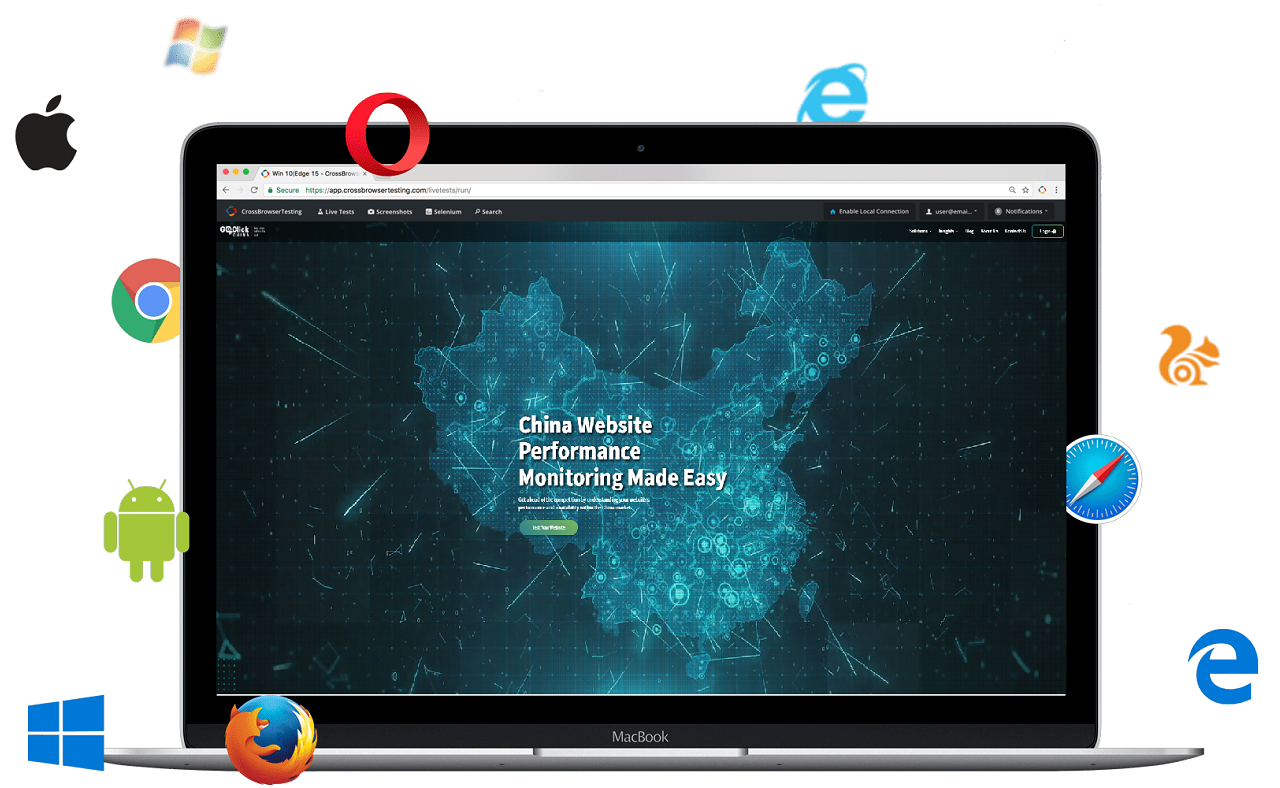Let’s say you’ve already received your ICP license and are ready to launch your website or app in China. Images are loading, videos are playing, and the site is fast — but this might not be the case for the end-user in your desired region. A cross-browser test in China can give you the confidence to launch.
Want to check how your website performs on the local browsers?
Send us your domain and get a testing report for FREE.
What is cross-browser testing
Cross-browser testing allows you to check if your website is loading and running on different browsers with different operating systems and various devices. The test can also verify the web applications or the basic characteristics of your website. You’ll be able to make sure your website provides a consistent and positive user experience by looking at indicators like:
- Performance - check whether the load speed and visual completeness is good on all browsers.
- Code verification - JavaScript and CSS can be verified correctly in all browsers.
- Web UI / UX - provide consistent user experience across the entire website, and make Web UI compatible for all browsers.
What cross-browser testing can inspect

- Browser version
Different devices may use different browser versions. Some phones can disable automatic app updates, so make sure that older browser versions are able to support the website or web app features you may have. - The device used
Browsers behave differently depending on the device being used. Certain hardware features influence it. In China, the latest statistics indicate that 60% of the country’s total device market share comes from mobile devices, 38.86% comes from desktops, and the remaining 1.14% is from tablet devices (Source). - Impact on assistive technology
Consider how people with certain disabilities would be able to interact with your website or web app. Some people may require the usage of a screen reader to access the Internet. Others may not be able to use a mouse to navigate their desktop device. - Whether code, such as JavaScript and CSS, runs properly
Scripts are another big issue when it comes to website performance across different browsers. It is therefore essential to conduct code verification on different Chinese browsers to ensure that your website displays and performs the way you want it to when accessed by internet users in China. - Whether UI/UX design is consistent across different browsers
Different browsers display user interfaces differently depending on their design principles. This definitely applies to both mobile as well as PC browsers in China too. 360 Browser, for example, often displays website content incorrectly since it was based on the old Internet Explorer. Websites should therefore be put through their paces on Chinese browsers to ensure that their user interfaces (UI) and the user experience (UX) are consistent with the aims of their owners. - Whether base functionality in intact across different browsersBase functionality refers to dialog boxes, form fields, website handles and seamless touch input, etc. Different browsers often handle the code which is responsible for base functionality differently. Here again, it is important to conduct thorough testing across the various browsers used in China to ensure that base functionality is intact across all of them.
- Whether WCAG (Web Content Accessibility Guidelines) accessibility for users with disabilities have been adhered to
The Web Content Accessibility Guidelines refer to web design guidelines that are aimed at ensuring that people with disabilities (e.g. blind and deaf internet users) are able to access web content as easily as possible. This is something that website owners need to verify by means of testing to ensure that their content can reach as much potential traffic as possible. - Whether online ads are compatible across different browsers
If you intend to run ads on your website, it is extremely important to ensure that they display correctly across different browsers so that you don’t end up wasting money on ads that don’t fetch any clicks due to browser incompatibility. - Whether widgets and plugins are compatible across different browsers
Widgets and plugins often malfunction when installed on browsers that they were not specifically designed for. For example, widgets and plugins that were designed for Chrome may not work in Firefox, etc. Since Chinese browsers were specifically designed for Chinese internet users, it is especially common for widgets and browsers designed for popular browsers outside of China to be incompatible with their Chinese counterparts, such as QQ browser and the Wechat Browser, etc. - How well cache handling occurs across different browsers
Cache handling refers to the storing of data pertaining to websites that have been accessed previously. Different browsers handle this process (caching) differently. As such, it is important to conduct thorough tests on the various browsers, particularly those designed for Chinese internet users, to ensure that your website is able to load as quickly as possible by taking advantage of browser-specific cache handling protocols.
Cross-browser testing may need extra special attention in China because the browsers used in the country may not be the same as the popular ones used worldwide. The latest statistics highlight the following browsers as the most used across China:
- Chrome (44.34%)
- UC Browser (14.7%)
- QQ Browser (10.4%)
- 360 Safe (9.37%)
- Safari (8.73%)
- Firefox (3.64%)
For more information on browsers, check out: Why you need to optimize for native mobile web browsers in China.
Why cross-browser testing matters
Overall, each of these browsers may have its own plug-in and hosting features that can impact the website speed, improve UI, security or accessibility, and stability.
But aside from overall speed, consider how each of these browsers can affect online ads. If you’re paying for ads — especially if they have dynamic content — test them on all browsers in China to ensure that you’re getting what you pay for.
Widgets and plug-ins are also tied to your overall website experience, mostly related to customer service and content marketing. Therefore, they need to be compatible with each browser to provide a seamless experience for your users. For example, if you have an auto-translate widget on your website, it may work on Safari but not on Chrome.
Content cache handling per browser must also be checked when doing cross-browser testing so you can see how your website data is stored and cleared within each browser.
With all the complexities and essential details involved with cross-browser testing, the best strategy for you may be partnering with a website company that specializes in the Chinese market to simplify the workload. Find a company with a team of experts who can do cross-browser testing within the context of China Internet usage, preferably across all regions, while still keeping it aligned with your website or web app launch strategy.
To learn more about succeeding in the China, check out our other articles.
If you want to learn more about testing in China, check out our solutions.



